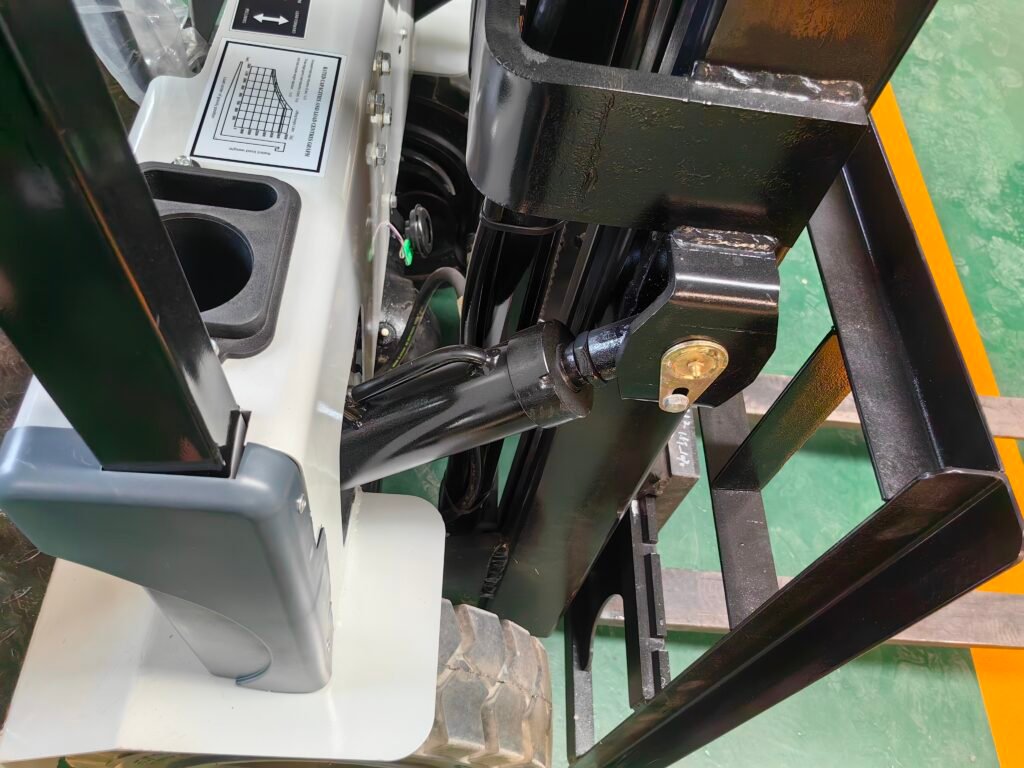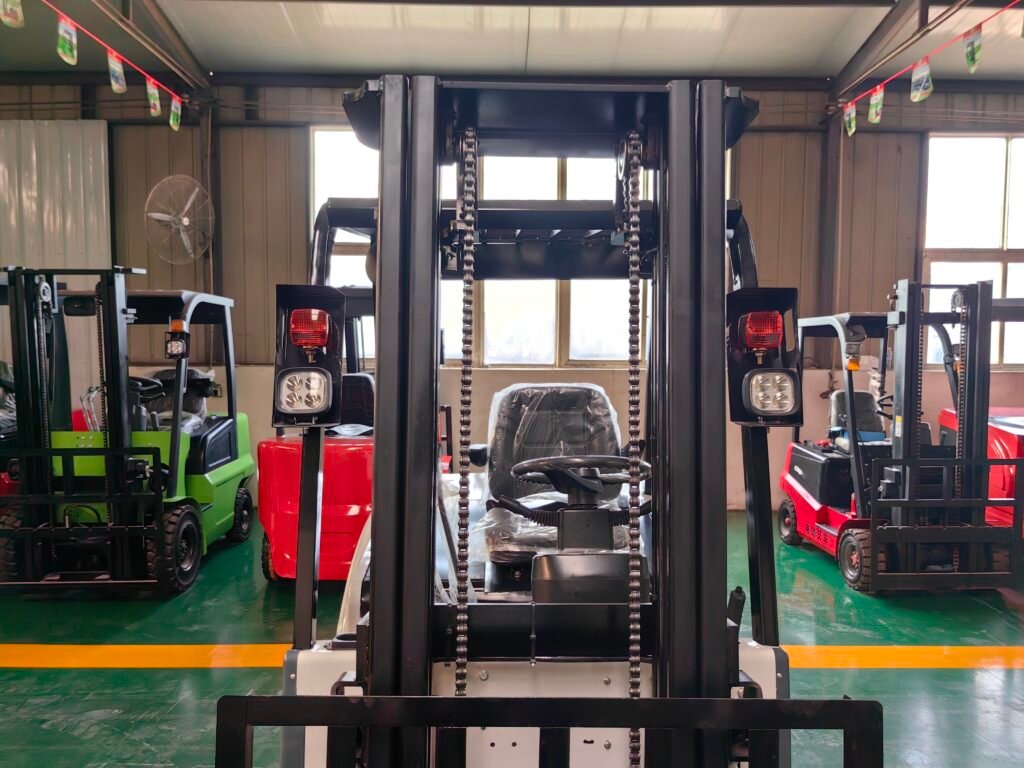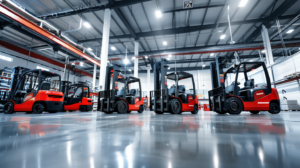The logistics and warehousing industries have seen exponential growth in recent years, and with it, the demand for efficient, reliable, and environmentally-friendly machinery has surged. Electric forklifts have become a cornerstone of modern material handling operations, offering an eco-friendly alternative to traditional internal combustion engine (ICE) forklifts. Among the many options available, Chinese electric forklifts have gained considerable attention due to their competitive pricing, advanced features, and solid performance.
Choosing the right Chinese electric forklift for your business requires careful consideration of various factors. This guide aims to walk you through the essential aspects to consider when making this critical decision, ensuring that you select a forklift that meets your operational needs while providing excellent value for money.

1. Understanding the Basics of Electric Forklifts
Before diving into the specifics, it’s crucial to understand what makes electric forklifts different from their ICE counterparts and why they might be the right choice for your business.
1.1 What is an Electric Forklift?
An electric forklift is a type of industrial truck powered by an electric motor rather than a combustion engine. These forklifts are powered by rechargeable batteries, typically lead-acid or lithium-ion, and are known for their quiet operation, zero emissions, and lower long-term operational costs.
1.2 Advantages of Electric Forklifts
- Environmental Friendliness: Electric forklifts produce no emissions, making them ideal for indoor operations and contributing to a greener workplace.
- Lower Operating Costs: While the initial purchase price may be higher, electric forklifts tend to have lower fuel and maintenance costs over time.
- Quiet Operation: The absence of a combustion engine means that electric forklifts operate much more quietly, reducing noise pollution in the workplace.
- Ease of Use: Electric forklifts generally have simpler controls and require less maintenance, making them user-friendly and reducing downtime.
1.3 Disadvantages to Consider
- Higher Initial Cost: The upfront cost of an electric forklift can be higher than that of a diesel or LPG forklift.
- Battery Management: Battery life, charging times, and the need for proper battery management are critical factors to consider.
- Power Limitation: Electric forklifts may have lower lifting capacities compared to some ICE models, which could be a limitation depending on your needs.

2. Determining Your Operational Requirements
Selecting the right electric forklift starts with a thorough understanding of your operational needs. Different industries and applications have varying requirements, and the forklift you choose should be capable of meeting these demands.
2.1 Load Capacity
The load capacity of a forklift is one of the most critical factors to consider. It refers to the maximum weight that the forklift can safely lift and transport. Here’s how to determine the right load capacity for your needs:
- Assess Your Load Weights: Calculate the average and maximum weight of the loads you typically handle. It’s crucial to select a forklift that can comfortably manage your heaviest loads.
- Consider Load Stability: Remember that the load capacity can be affected by the load center, which is the distance from the front of the forks to the center of gravity of the load. Forklifts have a rated load capacity at a specified load center; if your load center exceeds this, the effective load capacity decreases.
2.2 Lift Height
Lift height is another crucial factor, particularly if you are operating in a warehouse with high racking. The lift height is the maximum height at which the forklift can raise a load.
- Warehouse Layout: Measure the height of your racking systems and the ceiling height of your facility. Ensure that the forklift you choose can reach the top rack while maintaining stability.
- Mast Type: Consider whether a single, two-stage, or three-stage mast is required. A three-stage mast, for example, allows for greater lift heights without sacrificing maneuverability.
2.3 Working Environment
The environment in which the forklift will be used plays a significant role in the type of forklift you should choose.
- Indoor vs. Outdoor Use: Electric forklifts are ideal for indoor use due to their zero emissions and quiet operation. However, if your operations require outdoor use, especially on uneven terrain, ensure the forklift is suited for such conditions.
- Floor Conditions: Consider the condition of the floors in your facility. Smooth, level surfaces are ideal for electric forklifts, while rough or uneven floors may require specialized tires or suspension systems.
2.4 Operational Frequency
How frequently the forklift will be used is another important consideration.
- Daily Operating Hours: For operations that require continuous use, it’s essential to select a forklift with a battery that can sustain long operating hours or one that allows for quick battery swaps.
- Peak Usage Times: Assess if there are peak periods when forklift usage is particularly high. During these times, having an additional forklift or a faster charging solution might be necessary.

3. Evaluating Forklift Types and Features
Once you’ve assessed your operational needs, the next step is to evaluate the different types and features of electric forklifts available on the market.
3.1 Types of Electric Forklifts
There are several types of electric forklifts, each designed for specific applications:
- Counterbalance Forklifts: The most common type of forklift, these are versatile and can handle a wide range of loads. They have a counterweight at the rear to balance the load lifted by the front forks.
- Reach Trucks: Designed for high racking, reach trucks have an extended lift height and are ideal for narrow aisles.
- Pallet Jacks and Stackers: These are compact, low-lift forklifts designed for moving pallets in small spaces.
- Order Pickers: Used primarily in warehouses, these forklifts allow the operator to be lifted alongside the load for easy picking of individual items.
3.2 Key Features to Look For
When choosing an electric forklift, certain features can enhance performance, safety, and ease of use:
- Battery Type: Lead-acid batteries are traditional and more affordable, while lithium-ion batteries offer longer life, faster charging, and lower maintenance.
- Maneuverability: Consider the turning radius, particularly if you operate in tight spaces. Three-wheel forklifts generally offer better maneuverability than four-wheel models.
- Ergonomics: Features like adjustable seats, intuitive controls, and low step-in height can reduce operator fatigue and increase productivity.
- Safety Features: Look for forklifts with comprehensive safety features, including automatic speed reduction, stability control, and enhanced visibility.

4. Understanding Battery Technology
The battery is the heart of an electric forklift, and understanding the different types of battery technologies is essential when making your choice.
4.1 Lead-Acid Batteries
Lead-acid batteries have been the standard for many years. They are reliable and relatively inexpensive but come with certain limitations:
- Charging Time: Lead-acid batteries typically require 8 hours to charge fully, followed by an 8-hour cooling period.
- Maintenance: These batteries require regular maintenance, including watering and equalizing charges, to maintain performance and lifespan.
- Weight: Lead-acid batteries are heavy, which can contribute to the stability of the forklift but also limit its maneuverability.
4.2 Lithium-Ion Batteries
Lithium-ion batteries are becoming increasingly popular due to their advanced features:
- Fast Charging: Lithium-ion batteries can be charged much faster than lead-acid batteries, often in as little as 1-2 hours.
- Maintenance-Free: These batteries require no regular maintenance, saving time and reducing the total cost of ownership.
- Longer Lifespan: Lithium-ion batteries generally have a longer lifespan compared to lead-acid batteries, offering more charge cycles over their lifetime.
- Higher Efficiency: They offer more consistent power output, improving the overall performance of the forklift.

5. Considering the Total Cost of Ownership (TCO)
While the initial purchase price is important, it’s crucial to consider the total cost of ownership (TCO) when choosing an electric forklift. TCO includes all costs associated with owning and operating the forklift over its lifespan.
5.1 Initial Purchase Price
The upfront cost of the forklift is the most apparent expense, but it’s only a part of the total cost. Electric forklifts often have a higher initial cost compared to ICE models due to their advanced technology and battery systems.
5.2 Operating Costs
- Energy Costs: Electric forklifts are generally cheaper to operate in terms of energy costs compared to diesel or LPG forklifts. However, the type of battery and the cost of electricity in your area can affect this.
- Maintenance Costs: Electric forklifts typically require less maintenance than ICE forklifts. However, battery maintenance and eventual replacement are significant considerations.
- Downtime Costs: Consider the cost of any potential downtime due to battery charging or maintenance. Lithium-ion batteries can reduce downtime significantly due to their faster charging times.
5.3 Resale Value
Electric forklifts can have a good resale value, especially if well-maintained. Brands with a strong reputation, such as those with solid warranties and reliable performance records, tend to retain value better.
6. Exploring Chinese Forklift Brands
Chinese manufacturers have made significant strides in the forklift industry, offering high-quality machines at competitive prices. Here’s a look at some of the top brands to consider:
6.1 Leading Chinese Forklift Manufacturers
- Hangcha Group: One of the largest forklift manufacturers in China, Hangcha offers a wide range of electric forklifts with advanced features and robust performance.
- Lonking: Known for its cost-effective solutions, Lonking provides reliable electric forklifts that are ideal for small to medium-sized operations.
- Nicosail: Nicosail is a brand that has gained recognition for its innovative designs and high-quality electric forklifts. They offer a variety of models tailored to different operational needs, combining advanced technology with user-friendly features.
6.2 Quality and Reliability
Chinese electric forklifts have seen a significant improvement in quality and reliability over the years. Many manufacturers now use components from reputable global suppliers, ensuring that their forklifts meet international standards.
- Durability: Look for brands that offer durable designs with strong warranties. Nicosail, for example, is known for producing forklifts that are built to last, with robust construction and high-quality materials.
- Innovation: Chinese manufacturers are increasingly incorporating cutting-edge technology into their forklifts, such as advanced battery management systems and enhanced safety features.

7. Assessing After-Sales Support and Service
When purchasing a forklift, the level of after-sales support and service is just as important as the product itself.
7.1 Availability of Spare Parts
Ensure that the manufacturer or dealer has a robust supply chain for spare parts. This is crucial for minimizing downtime and maintaining the forklift’s performance over time.
- Local Dealers: Check if the brand has a network of local dealers who can provide spare parts and servicing. This is particularly important for Chinese brands operating internationally.
- Parts Availability: For brands like Nicosail, which are expanding globally, ensure that they offer a reliable supply of spare parts to avoid delays in maintenance.
7.2 Warranty and Service Packages
A comprehensive warranty and service package can provide peace of mind and protect your investment.
- Warranty Terms: Look for brands that offer extensive warranties on both the forklift and the battery. A longer warranty period is often a sign of confidence in the product’s durability.
- Service Contracts: Consider service contracts that include regular maintenance, battery servicing, and emergency repairs. Brands that offer these services can help reduce operational disruptions.
8. Evaluating the Brand Reputation
Brand reputation is an important factor to consider, particularly when purchasing from a Chinese manufacturer. A strong reputation often indicates a commitment to quality, innovation, and customer satisfaction.
8.1 Customer Reviews and Testimonials
Customer reviews and testimonials can provide valuable insights into the real-world performance of a forklift. Look for reviews from businesses similar to yours to see how the forklift performs in similar conditions.
- Case Studies: Some manufacturers provide case studies that demonstrate how their forklifts have been used in various industries. This can be particularly useful in assessing the forklift’s suitability for your operations.
- Industry Awards: Check if the brand has received any industry awards or recognition. This can be an indicator of the brand’s standing in the market.
8.2 Dealer Reputation
The reputation of the dealer or distributor is also crucial. A reputable dealer will provide reliable support, transparent pricing, and efficient service.
- Authorized Dealers: Ensure that you purchase from an authorized dealer who is officially recognized by the manufacturer. This ensures that you receive genuine products and support.
- Customer Service: Evaluate the dealer’s customer service record. A dealer that offers prompt, courteous, and knowledgeable support can make a significant difference in your overall experience.

9. Customization Options
Depending on your specific operational needs, you may require a forklift that offers certain customizations or optional features.
9.1 Attachments and Accessories
Forklift attachments can significantly enhance the versatility of your forklift.
- Common Attachments: Some of the most common attachments include side shifters, fork positioners, and clamps. These can help tailor the forklift to your specific needs.
- Compatibility: Ensure that the forklift model you choose is compatible with the attachments you require. Brands like Nicosail often offer a range of attachments designed to work seamlessly with their forklifts.
9.2 Custom Features
Some manufacturers offer custom features or modifications to meet unique operational requirements.
- Custom Masts: If your operation requires specialized lift heights, consider a custom mast option.
- Operator Cabs: In outdoor environments or harsh conditions, an enclosed operator cab with climate control may be necessary.
10. Testing and Trial
Before making a final decision, it’s advisable to test the forklift under actual working conditions.
10.1 Demo Units
Many dealers offer demo units for testing purposes. Take advantage of this to evaluate how the forklift performs in your specific environment.
- Performance Testing: Assess the forklift’s performance in terms of lift capacity, maneuverability, and battery life.
- Operator Feedback: Involve your operators in the testing process. Their feedback on ergonomics, ease of use, and overall comfort can be invaluable.
10.2 Long-Term Trials
For larger investments, some dealers may offer long-term trials. This allows you to fully assess the forklift’s performance over a longer period.
- Full Operational Trial: A long-term trial can reveal insights into the forklift’s reliability, maintenance needs, and overall suitability for your operations.
- Comparison: If possible, test multiple models to directly compare their features, performance, and ease of use.

11. Making the Final Decision
After thoroughly evaluating all the factors, it’s time to make your final decision.
11.1 Balancing Cost and Features
While it’s important to stay within budget, don’t compromise on critical features that are essential for your operations.
- Value for Money: Consider the overall value for money, balancing the forklift’s cost with its features, performance, and expected lifespan.
- Brand Reliability: Opt for a brand that has a proven track record for reliability and support, such as Nicosail, which offers a blend of innovation, quality, and competitive pricing.
11.2 Future-Proofing Your Investment
Choose a forklift that can grow with your business. Consider future operational needs and ensure that the forklift you choose can adapt to any changes in your operations.
- Scalability: If you anticipate growth, choose a forklift that offers scalability, such as the ability to add attachments or increase load capacity.
- Technology Upgrades: Consider brands that offer technology upgrades or have a roadmap for future innovations.
12. Conclusion
Choosing the right Chinese electric forklift involves careful consideration of many factors, from understanding your operational needs to evaluating different brands and models. By taking a systematic approach to your decision-making process, you can select a forklift that not only meets your current requirements but also positions your business for future success.
Chinese manufacturers like Nicosail offer a compelling mix of quality, innovation, and value. With the right research and due diligence, you can find a forklift that delivers excellent performance and long-term reliability, ensuring a solid return on your investment.
FAQs
1. What is the average lifespan of a Chinese electric forklift?
The lifespan of a Chinese electric forklift can vary depending on the manufacturer, model, and usage. On average, a well-maintained electric forklift can last between 10 to 15 years. Factors such as battery life, frequency of use, and maintenance practices play a significant role in determining longevity.
2. Are Chinese electric forklifts reliable for heavy-duty operations?
Yes, many Chinese electric forklifts are reliable for heavy-duty operations. Brands like Nicosail have developed models that are capable of handling rigorous industrial applications. However, it’s crucial to select a model that matches your specific load capacity and operational needs.
3. How does battery maintenance differ between lead-acid and lithium-ion batteries?
Lead-acid batteries require regular maintenance, including watering, equalizing charges, and cleaning to prevent acid buildup. In contrast, lithium-ion batteries are virtually maintenance-free, offering a longer lifespan and more consistent performance without the need for regular upkeep.
4. Can I use a Chinese electric forklift outdoors?
Yes, many Chinese electric forklifts are designed for both indoor and outdoor use. However, it’s important to ensure that the model you choose is suited for outdoor environments, particularly if you’ll be operating on uneven terrain or in varying weather conditions.
5. What are the key safety features to look for in a Chinese electric forklift?
Key safety features to consider include stability control, automatic speed reduction, enhanced visibility with LED lights, and ergonomic operator controls. Some models also offer advanced safety technologies such as collision detection systems and operator presence sensing systems.
6. How do I ensure I’m getting a good deal on a Chinese electric forklift?
To ensure you’re getting a good deal, compare prices from multiple dealers, check for any hidden costs, and evaluate the total cost of ownership. Additionally, consider the reputation of the manufacturer and dealer, and take advantage of warranties and service packages offered.





